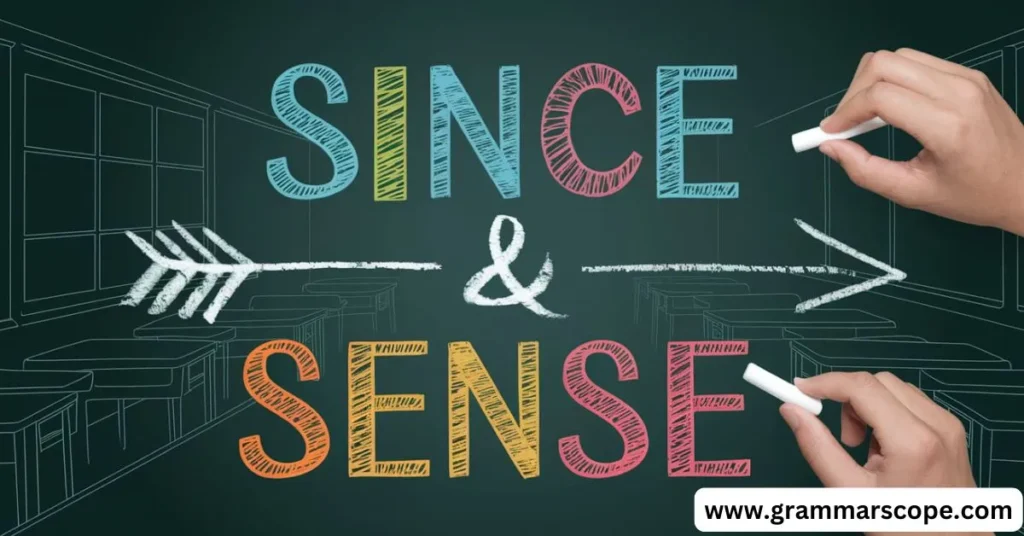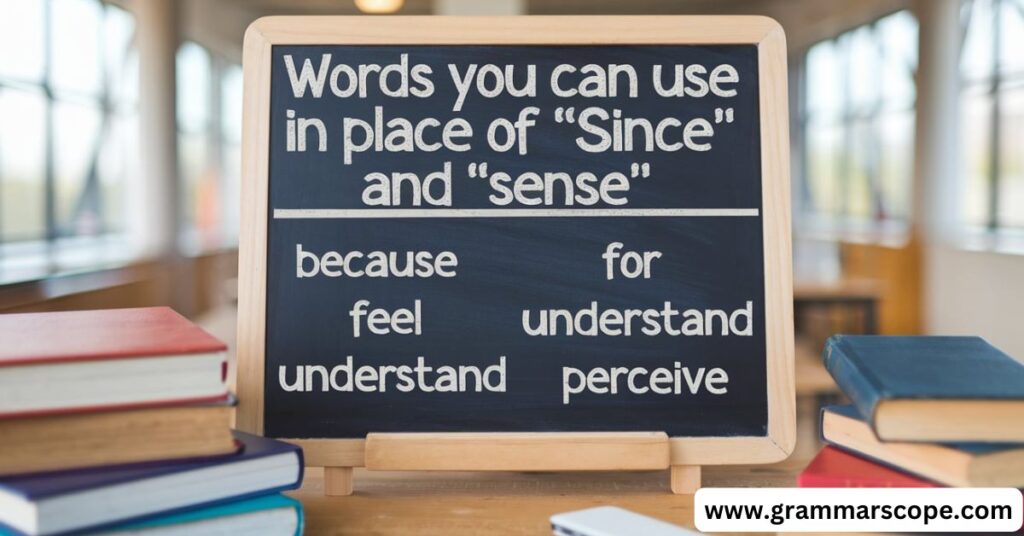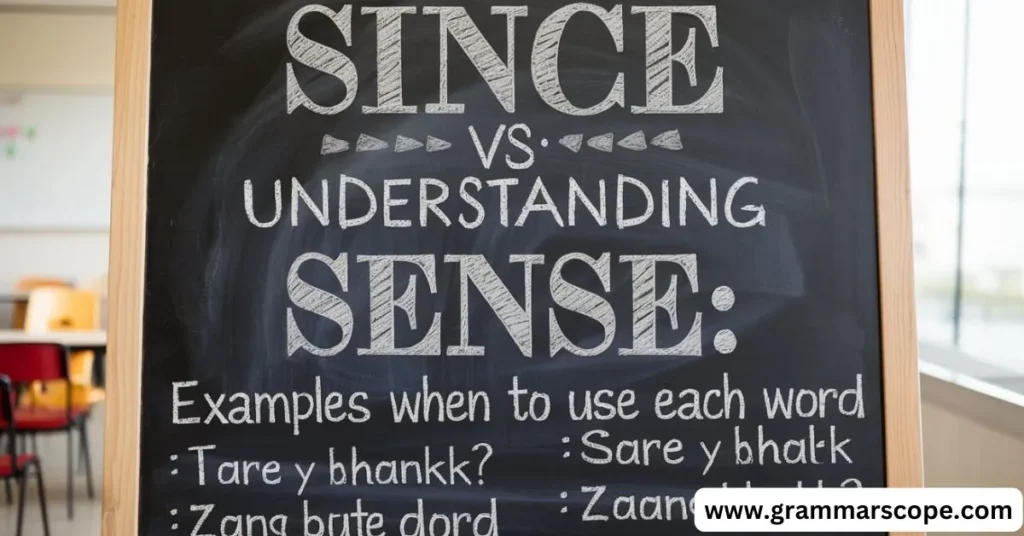Words that sound the same but have different meanings known as homophones often trip up even the most seasoned writers. “Since” vs “sense” are prime examples. At first glance, they might seem interchangeable, but their usage couldn’t be more distinct. Misusing these words can muddle your message, confuse your audience, or even alter the meaning of your sentence entirely.
Imagine emailing a colleague: “That makes since.” While your intent might be clear, the incorrect word can leave a lasting impression one of carelessness. The right word, “sense,” not only clarifies your meaning but also elevates your communication. Understanding the difference between “since” and “sense” isn’t just about grammar; it’s about being an effective communicator in everyday life.
In this guide, we’ll explore the definitions, uses, and nuances of these two words with relatable examples. Whether you’re explaining a concept that makes sense or discussing something that’s been happening since last year, this article will help you master their differences and use them with confidence.
Defining “Since” and “Sense”

Since
“Since” is a versatile word that serves multiple functions in English. It can act as a conjunction, preposition, or adverb, depending on how it connects ideas in a sentence. Let’s break it down further.
As a Conjunction
When used as a conjunction, “since” introduces a reason or explains causation. It’s synonymous with “because.”
- Example: Since it’s raining, bring an umbrella.
- Scenario: Imagine an email to a coworker: “Since the project deadline was extended, we have more time to refine the proposal.”
As a Preposition
In this role, “since” marks the starting point of a period of time.
- Example: I’ve been working here since 2015.
- Scenario: In a conversation, you might say: “I’ve been friends with Jake since college, and we’ve stayed close ever since.”
As an Adverb
“Since” as an adverb connects past events to the present moment.
- Example: He left the company two years ago and hasn’t contacted us since.
- Scenario: In an update to a client, you could write: “The software was updated two months ago, and users have had fewer issues since.”
Sense
“Sense” is a multifaceted word that primarily functions as a noun or verb. It revolves around perception, feelings, and understanding.
As a Noun
- Perception or Feeling: It refers to the faculties through which we perceive the world—sight, sound, smell, taste, and touch.
Example: The strong sense of smell helps dogs detect hidden objects. - Understanding or Intuition: It denotes logical clarity or intuition.
Example: The instructions don’t make much sense.
As a Verb
- To Detect or Perceive: It describes becoming aware of something through intuition or sensory input.
Example: She could sense the tension in the meeting room. - Scenario: In an email to a colleague, you might write: “I sense that the team needs additional training to meet this quarter’s goals.”
“Since” vs “Sense”

“Since” as a Time Traveler (or Reason Giver):
Think of “since” as your time machine, whisking you back to a starting point or explaining why something happened. For example:
- Time: I’ve lived in this city since 2010.
- Reason: Since we completed the report early, let’s move on to the next task.
Pro Tip: If “since” works with “because” in your sentence, you’re using it correctly.
“Sense” as Your Internal Compass:
“Sense” guides your understanding of the world. Use it to describe intuition, feelings, or meaning.
- Example: This feedback doesn’t make sense; we need more details.
- Pro Tip: Replace “sense” with “understanding” to test if it fits.
Key Differences Between “Since” and “Sense”
| Feature | Since | Sense |
|---|---|---|
| Part of Speech | Conjunction, Preposition, Adverb | Noun, Verb |
| Primary Meaning | Refers to time or reason | Refers to perception, feelings, or understanding |
| Usage Examples | Since it’s late, let’s leave. (reason) | Does this make sense? (understanding) |
| Testing | Replace with “because” to check accuracy | Replace with “understanding” to check accuracy |
Putting it into Practice: Makes Sense or Since?
If you’re writing an email and wondering whether to say “makes sense or since,” here’s how to decide. Use “makes sense” when referring to clarity or logic:
- Example: “After reviewing your explanation, everything makes sense now.”
Use “since” when giving a reason: - Example: “Since it makes sense, let’s move forward with this strategy.”
Examples in Context
Since (Time and Reason):
- Timeframe: We’ve been collaborating since the launch of the campaign.
- Reason: Since you’ve completed your portion, I’ll start mine now.
Sense (Understandings and Feelings):
- Understanding: Does that make sense? If not, let’s clarify.
- Feeling: I get the sense that this decision aligns with our values.
Words You Can Use in Place of “Since” and “Sense”

Since
- When Indicating Time:
- From: I’ve known her from high school.
- After: After the presentation, we’ll have time for questions.
- When Indicating Reason:
- Because: Because it’s raining, we canceled the picnic.
- As: As you’re here, let’s begin.
Sense
- When Referring to Perception or Feeling:
- Awareness: She had a heightened awareness of her surroundings.
- Intuition: Her intuition told her something was wrong.
- When Referring to Meaning or Understanding:
- Meaning: What’s the meaning of this phrase?
- Significance: The significance of this event is undeniable.
Origins of “Since” and “Sense”
“Since” comes from Old English “siþþan,” meaning “after” or “later.” Over time, it evolved into the modern form, retaining its temporal and causal meanings.
“Sense” traces back to Latin “sensus,” referring to perception or feeling. It entered Middle English as a term for awareness and understanding.
Pro Tips for Mastering “Since” vs “Sense”
- Test Your Word Choice:
Replace “since” with “because” or “sense” with “meaning” to check your sentence.- Example: Does that make sense? If so, we can proceed.
- Scenario Practice:
Create practice sentences based on your daily writing needs.- Email Example: Since this policy aligns with our goals, I sense it will succeed.
- Remember Their Functions:
- “Since” = Time or Reason.
- “Sense” = Perception, Feeling, or Meaning.
Frequently Asked Question
When should you use sense?
Use “sense” for perception, understanding, feelings, or meaning in contexts like awareness (five senses), logic, intuition, or coherence. Example: “Does that make sense?”
Is it made sense or made since?
The correct phrase is “made sense”, not “made since.”
“Made sense” means something is logical or understandable.
Example: “After her explanation, it all made sense.”
“Made since” is incorrect because “since” is used to refer to time or a reason, not in this context.
How do I use the word sense?
The word “sense” can be used in several ways depending on the context. Here’s how to use it correctly:
- Perception or Awareness (Five Senses): Referring to how we perceive the world through sight, hearing, taste, touch, and smell.
- Example: “I have a good sense of hearing.”
- Understanding or Judgment: Used when something is logical or understandable.
- Example: “That explanation makes sense.”
- Intuition or Feeling: Referring to an instinctive feeling or perception.
- Example: “I had a strange sense that something was wrong.”
- Meaning or Significance: Used when discussing the meaning of something.
- Example: “The poem has a deep sense of loss.”
- Sensible or Practical Action: Refers to being reasonable or practical.
- Example: “It makes sense to leave early to avoid traffic.”
By using “sense” in these contexts, you convey meaning related to perception, understanding, feelings, or logic.
Are sense and since homophones?
Yes, “sense” and “since” are homophones. They sound alike but have different meanings and spellings.
- Sense refers to perception, understanding, or feeling (e.g., “It makes sense to leave early”).
- Since refers to a point in time or a reason (e.g., “I’ve known her since childhood” or “Since it’s raining, let’s stay inside”).
When to use sense or since?
- Use “sense” for perception, understanding, or intuition.
Example: “That makes sense.” - Use “since” for time or reason.
Example: “I’ve known her since 2010.”
A Final Look
“Since” vs “sense” might sound similar, but their purposes are worlds apart. “Since” marks time or gives reasons, while “sense” captures perception and understanding. Next time you’re choosing between “makes since or sense” in a sentence, trust your new understanding to guide you. Use these words with precision, and you’ll sound clear, professional, and polished every time. Does that make sense? Great—now go apply it!

Emma Olivia is an experienced blogger and the creative mind behind Grammar Scope. With a passion for language and years of writing expertise, she crafts engaging, informative content that simplifies grammar and writing tips for readers worldwide. Emma’s dedication to clear communication and love for the written word shine through every article she publishes, making Grammar Scope a trusted resource for language enthusiasts and learners alike.







Very descriptive blog, I enjoyed that a lot. Will there be a part 2?